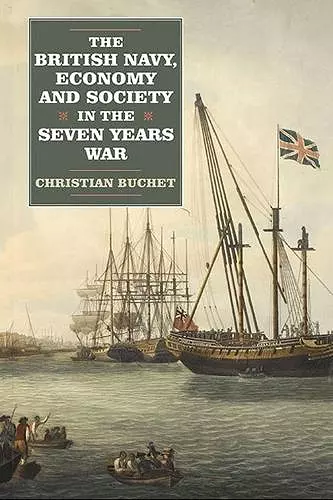The British Navy, Economy and Society in the Seven Years War
Format:Hardback
Publisher:Boydell & Brewer Ltd
Published:21st Feb '13
Currently unavailable, and unfortunately no date known when it will be back

An analysis of how Britain developed a superb supply system for the navy, with beneficial consequences both for victory in war and for Britain's economic development. A very important analysis of British naval victualling, with wide implications for economic as well as naval history. N.A.M. RODGER, All Souls College, Oxford This book, by a leading French maritime historian, discusses how Britain's success in the Seven Years War (1756-63) was made possible by the creation of a superb victualling system for the British navy. It shows how this system had been developed over the preceding centuries, how it balanced carefully the advantages of state control with the flexibility of commercial contracting, and how the system was designed to mesh with and support British strategic ambitions. It provides rich detail on how the system worked,how it was administered, how key products were priced, bought, stored and transported, and how it compared, very favourably, to equivalent systems in France and elsewhere. The book shows how the increasing efficiency of theVictualling Board enabled the navy to take advantage of agricultural, commercial and financial advances in the British economy to supply its front line fighting forces over ever longer distances and ever longer periods. The Victualling Board was one of a number of interfaces between the demands of the State and the supply facilities of the economy, to their mutual benefit. As a major purchaser through competitive tender, the Board made a positive contribution to the entrepreneurial spirit of British society. The book goes beyond maritime history by discussing how naval supply provided a huge stimulus for British finance, agriculture, trade and manufacturing, and argues that all this together was one of the principal causes of Britain's later Industrial Revolution. CHRISTIAN BUCHET is Professor of Modern History and Director of the Centre d'Etudes de la Mer at the Institut Catholique de Paris. Besides comparative studies of the British and French navies 1688-1783, he has written extensively on maritime environmental issues and is Secretary General of the National Council of the French Archipelago.
Impressively grounded on extensive empirical research and provides a thorough explanation of English naval victualing during the first half of the eighteenth century. * HISTORY *
A welcome addition to anyone's maritime history library. * NAUTICAL RESEARCH JOURNAL *
Buchet's excellent and thoroughly empirical case study demonstrates how the Royal Navy came to spend a very significant percentage of the state's budget, actively anticipating the capitalist system, and 'was surely one of the major forces behind British economic development'. * FORUM NAVALE *
Fascinating reading for anyone interested in the impact of the Royal Navy above and beyond the defence of the realm. -- JULIAN STOCKWIN, novelist and blogger
An essential part of naval administrative historiography. . To have Buchet's work available in English will be a great boon to scholars. * H-WAR, September 2013 *
Argues convincingly that the wartime requirements of the government compelled lasting changes in the British economy. * CHOICE *
ISBN: 9781843838012
Dimensions: unknown
Weight: 556g
316 pages